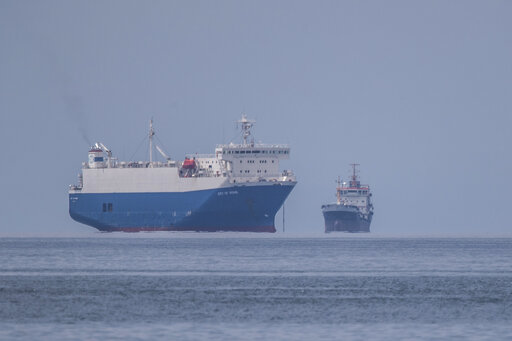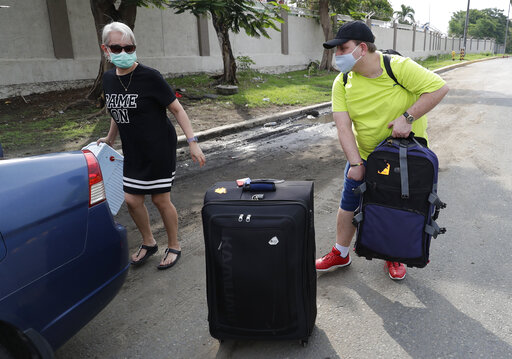
At the beginning of May, ships around the world sounded their horns as a gesture of support for hundreds of thousands of seafarers trapped at sea as a result of the COVID-19 pandemic.
Since then, not much has changed for what Guy Platten, secretary general of the International Chamber of Shipping (ICS), calls "in some ways, the forgotten army of people."
The International Labor Organization (ILO) this week issued an SOS for governments to take "urgent and coordinated action to release the 150,000 to 200,000 seafarers" – many stranded far from home because of lockdowns and border closures.
"Many of those on board completed their tours of duty more than four months ago but with contracts extended exceptionally because of the crisis, many are now reported to be experiencing mental health issues and physical exhaustion, which is reducing their ability to safely carry out their duties," the ILO said in a statement.
The ICS, a global organization of shipowners, had previously expressed concern at claims that some seafarers with clear signs of medical distress were even being denied entry to ports or evacuation by port authorities.
"We're receiving alarming reports of seafarers who are suffering from serious medical injury such as a stroke, being denied medical evacuation for over four days. This is simply not acceptable," the statement on May 28 said.

Cruise ship workers were the early faces of stranded ships during the coronavirus pandemic. In this May 8, 2020 photo, people aboard the Norwegian Epic cruise ship docked at PortMiami in Miami, sit on their balconies as they awaited negotiations for the disembarkation of passengers. /AP
Cruise ship workers were the early faces of stranded ships during the coronavirus pandemic. In this May 8, 2020 photo, people aboard the Norwegian Epic cruise ship docked at PortMiami in Miami, sit on their balconies as they awaited negotiations for the disembarkation of passengers. /AP
The ILO called on governments worldwide to classify these sailors as "key workers providing an essential service" to allow for them to return to shore and be replaced by fresh workers. This was a reiteration of a joint call made three weeks ago by the Geneva-based United Nations agency as well as the International Civil Aviation Organization and the International Maritime Organization.
The three entities estimated that from the middle of June, around 150,000 seafarers a month will require international flights in order to be changed over from the ships that they operate – about half traveling by aircraft for repatriation, the other half joining ships.
Since the outbreak of the virus, restrictions brought in by countries to reduce the spread of COVID-19 as well as the drastic reduction of air traffic have prevented routine crew changeovers on ships.
The measures have also meant that seafarers waiting to return to sea have lost their income.
'Maritime prisoners'
Their plight has not dominated headlines even though more than 80 percent of global trade by volume is moved by maritime transport and is dependent on the two million seafarers who operate the world's merchant ships.
"They're out of sight and out of mind, and yet they're absolutely essential for moving the fuel, the food, the medical supplies and all the other vital goods to feed world trade," Platten said.
The situation for many of them is grim. "Seafarers onboard cargo ships are now, in effect, prisoners unable to leave the ship, even to go ashore and use basic facilities, such as the internet, that most of us take for granted," Helen Devereux, a researcher in seafarer health and safety at Solent University in the UK, says in a blog post.

Italian seafarer Claudio Romano, from Rome, is met by his wife as he arrives back in Laguna province, southern Philippines, after spending weeks quarantined on a ship, May 28, 2020. /AP
Italian seafarer Claudio Romano, from Rome, is met by his wife as he arrives back in Laguna province, southern Philippines, after spending weeks quarantined on a ship, May 28, 2020. /AP
Andrei Kogankov, the captain of an oil tanker, and his crew haven't been on dry land for almost four months, after being bumped from port to port.
"We are working 24/7," the Associated Press quoted him on June 4 as saying by satellite phone from Thailand. "We don't have, let's say, Friday night or Saturday night or weekends. No, the vessel is running all the time."
Glimmer of hope
The slow move towards the opening of borders means that there is unlikely to be a sea change in crew turnovers in the short term.
But recent developments offer a glimmer of hope that the situation may be easing, even if slowly. On Tuesday, Hong Kong, one of the world's biggest hubs for shipping operations, announced that it will allow crew changes for all nationalities, with safety measures in place.
For instance, seafarers whose contracts have expired must travel directly to the airport to ensure there is little contact with local residents. Incoming crew members have been told not to arrive in Hong Kong until their vessels are berthed there and head straight to the ships immediately on arrival.
One leading ship services company, Fleet Management Limited, is also reporting "considerable success" in China, with crew changes for 609 seafarers, and India (432), according to Seatrade Maritime News website.
Top photo: A cargo ship approaches the port of Piraeus near Athens, Greece, May 26, 2020. During the new coronavirus pandemic, about 150,000 seafarers are stranded at sea in need of crew changes, according to the International Chamber of Shipping. Roughly another 150,000 are stuck on shore, waiting to get back to work. /AP